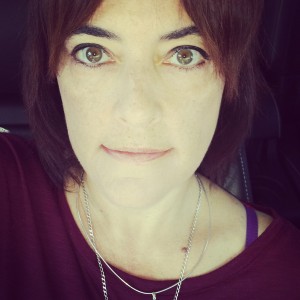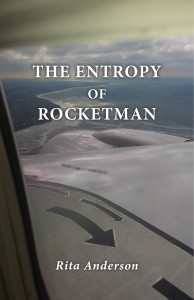Playwright and poet Rita Anderson joins me here today to answer a question that many writers ask themselves: “Is grad school right for me?”
To “Grad School” or Not “to Grad School”—If That is Your Question
By Rita Anderson
One of the hottest debates in writing circles revolves around the “merits” of attaining a Masters Degree in Playwriting (etc.), and the “pros” & “cons” of making that time and financial sacrifice versus the results an advanced degree may or may not yield. Today, and in this short space, I have no dreams of presenting a comprehensive case that resolves these issues to put the last—let alone an eloquent (*throat-clearing*)—nail in that coffin. No, Ma’am. But, since I have two graduate degrees from different writing programs, many years apart, I hope to shed a bit of light that can help you decide what course of action is best for you. And, I present this in mock Q & A style because I believe a spoonful of sugar does, indeed, help the medicine go down. . .
Q: Why two graduate degrees? (Wasn’t one enough? Are you a glutton for punishment, or did the first grad program not “take”? Or maybe you found a really great coupon–like a “twofer” deal: Buy one Masters get the second absolutely “free”?)
A: You would go there, first, hhhmmm. . . The most straightforward answer is, I recently pursued an MA Playwriting because I wanted a PhD in theatre. It was a personal goal. That, and I wanted to be called, “Dr. Anderson,” occasionally. My MFA Creative Writing (Poetry emphasis) didn’t give me the background I needed for theatre so I had to jump ship and start “over” in that genre. Also, to be honest, I was “sold a bill of goods” with that MFA, a terminal degree. But, fact is, in the job market, it never held its promised weight. Academia is glutted with MFAs so, when given the option between a candidate with an MFA and one with a PhD, universities opt for tradition and, all else being equal, they hire the PhD.
Q: So are you getting a PhD?
A: Nope. These last few years, chasing the MA Playwriting, were brutally exhausting and the idea of five additional years was a deal-breaker for me. (Remember how we used to say, “I’m in the 12th grade,” etc.? Well, I’d be in like the 24th grade by then, so, No. Just no.)
Q: Is this on the test?
A: Next question, please.
Q: Can’t I just read a bunch of books by myself? I’ve seen Good Will Hunting and, if he could do it, then. . .
A: The old, “Is it worth it?” spiral. Ok, you can, and every writer should be reading everything she can get her hands on because there are so many mistakes that beginning writers make. But, the one thing that creative grad school workshopping taught me that I would never have learned in isolation is what NOT to do and HOW not to write. Being called out in public and surviving some tough cuts and rewrites made me a more resilient artist and a stronger writer. (Plus, Will Hunting does go to grad school, in the end, so he can learn to control his chaos.) No grad school, however, can give you talent. You have to have talent. It’s not learned, only shaped.
Q: Does degree pedigree matter?
A: They can be shortcuts. Instant access like a fast-pass at an amusement park. (You pay more to avoid lines, get better “service,” a “richer” experience.) Like it or not, some names and connections open doors (just like bad experiences can bar you from entry. People aren’t joking when they say, Theatre is a small world. Well, I don’t think it’s that small, but people talk. And the thinking is often “small” and cliquish). Pedigree matters, but so does location and the quality of the grad program itself. So, while neither of my degrees are from Gucci-grad schools, the location of my MFA was New Orleans. Which meant that (a) I enjoyed my surroundings while investing three years of my life studying, and (b) every writer in the world wanted to visit NOLA so I was able to tap into thirty private (only six writers selected) workshops, as “lagniappe.” Talk about invaluable experiences? Having that exposure to so many writing styles and POV changed my writing which, alone, was worth the “price of admission” to grad school. –So, pick a place you want to be! Faculty helps, but you’re mostly on your own.
Q: Will I make lifelong friends and influence people?
A: I confess, this corny chestnut was the underlying incentive in a lot of my drive to return to grad school. I wanted to connect with fellow artists but, honestly, I was now a “non-traditional” student and I had little in common with the 20-somethings in the program, who partied. A lot. So, no. I only made two, lasting friendships, but because I was ready to connect, deeply, with the theatre world, I wrote papers and plays that got me into six national theatre conferences (where I DID make friends and network). I wrote eight full-length plays in three years (2011-2014), had my first paper and play published, and six of my plays went to the Kennedy Center American College Theatre Festival (KCACTF). Without enrollment in a graduate program, I never could have gone on to win the Ken Ludwig Scholarship & Award for “best body of work.”
 Rita Anderson, a member of ICWP, Dramatists Guild, and ScriptWorks, has an MFA Creative Writing and an MA Playwriting. A published and award-winning playwright and poet, Rita went on scholarship to The O’Neill (CF 2012). Her play, Frantic is the Carousel, was the 2013 National Partners American Theatre (NAPAT) nominee, when she won the Kennedy Center’s Ken Ludwig Playwriting Award for “best body of work.” She’s had nineteen productions (to include NYC, Boston, Houston, Dallas, Austin, Detroit, Cincinnati—and in London, England, and Paris, France). Early Liberty, internationally published at www.offthewallplays.com, is on their “Best Selling Plays” list. She was appointed to ITN Playwrights Advisory Panel, and three one-acts are available at www.indietheaternow.com, but the highlight of her emerging career so far was sitting on a playwriting panel with Christopher Durang. Contact Rita at www.rita-anderson.com
Rita Anderson, a member of ICWP, Dramatists Guild, and ScriptWorks, has an MFA Creative Writing and an MA Playwriting. A published and award-winning playwright and poet, Rita went on scholarship to The O’Neill (CF 2012). Her play, Frantic is the Carousel, was the 2013 National Partners American Theatre (NAPAT) nominee, when she won the Kennedy Center’s Ken Ludwig Playwriting Award for “best body of work.” She’s had nineteen productions (to include NYC, Boston, Houston, Dallas, Austin, Detroit, Cincinnati—and in London, England, and Paris, France). Early Liberty, internationally published at www.offthewallplays.com, is on their “Best Selling Plays” list. She was appointed to ITN Playwrights Advisory Panel, and three one-acts are available at www.indietheaternow.com, but the highlight of her emerging career so far was sitting on a playwriting panel with Christopher Durang. Contact Rita at www.rita-anderson.com
 THE ENTROPY OF ROCKETMAN by Rita Anderson
THE ENTROPY OF ROCKETMAN by Rita Anderson
“A classic lyric terrain of desire and loss creates the ground for the taut, smart poems in Rita Anderson’s The Entropy of Rocketman. With droll irony, Anderson describes love as a “noble gas” (to be specific, the radioactive Uranium 238!), at once volatile and seductive; contemplates the “ancient need for more”; and returning imaginatively to explore the “old house” (now empty but “still intact”) that love built, asks in a moment of wry paradox, “What if the undrawn line is the truest parameter, / one we cannot erase but would never cross?” These poems shimmer with clarity, the deep and hard-won emotional wisdom that limns this brilliant collection.”





